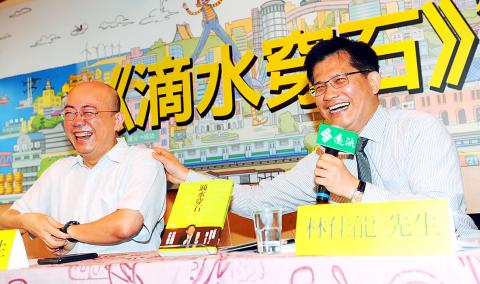Former Democratic Progressive Party (DPP) legislator Julian Kuo (郭正亮) yesterday promoted his proposal to freeze the Taiwanese independence clause in the party’s charter, saying that it is aimed at maintaining the nation’s “status quo,” which would help the party in the next presidential race, but agreeing that its adoption could be pushed back until after the year-end local elections.
Before attending the launch of a book about DPP Legislator Lin Chia-lung (林佳龍), the party’s nominee for the Greater Taichung mayoral poll in November’s local elections, Kuo said the US wants a Taiwan that maintains the “status quo,” which is why it supported the Chinese Nationalist Party (KMT) in the 2012 presidential election.
“The idea of freezing the Taiwan independence clause is to maintain the ‘status quo’ in the hope that the US will be neutral in the 2016 presidential election,” Kuo said.

Photo: Chang Chia-ming, Taipei Times
Kuo said he was under no illusion that the Chinese Communist Party would support the DPP if it froze the clause, but does believe it would allow Washington to be neutral in the next presidential poll.
The independence clause of the DPP charter adopted in 1991 calls for the creation of the “Republic of Taiwan” and a new constitution.
Kuo’s proposal, cosponsored by many other DPP delegates, was briefly discussed at the national party congress on Sunday, until DPP Chairperson Tsai Ing-wen (蔡英文) decided to refer it to the Central Executive Committee for discussion and, if necessary, deal with it at a future congress.
Kuo said that the nationwide nine-in-one elections to be held on Nov. 29 are the party’s top priority right now and discussion of the proposal could wait until after the elections or the Lunar New Year holiday early next year.
By waiting, the DPP could ride the crest of success in the local elections and the momentum of choosing the party’s presidential candidate in May next year to help the measure pass at the next national congress in July of that year, Kuo said.
In other news, a Chinese academic has argued that that the DPP remains the biggest hurdle for the peaceful development of cross-strait relations, a digital Chinese media outlet reported.
Zhou Zhihuai (周志懷), director of the Chinese Academy of Social Sciences’ Institute of Taiwan Studies, made the remarks at a cross-strait relations seminar that opened in Qinghai Province yesterday, www.crntt.com reported.
Zhou said that as the two sides of the Taiwan Strait make major progress on peacefully developing relations, four issues have arisen:
After Tsai was re-elected as DPP chair in May, she said that “freezing the Taiwan Independence clause would require a lot of time” and that “China will adjust to the DPP after it triumphs in the year-end local elections,” Zhou was reported as saying. “This shows that the DPP is still the biggest hurdle to the peaceful development of cross-strait ties.”
Another issue was the mass protest in March against the cross-strait services trade agreement — dubbed the Sunflower movement — which Zhou said shows that while Taiwanese are supportive of the peaceful development of bilateral ties, they have misunderstandings and misgivings about the future course of these relations.
Also, the existing political differences between the two sides have become more salient and both parties need to address them squarely, he said.
Finally, Taiwan is to stage two major electoral events soon — the year-end local elections and the 2016 presidential poll — which will create uncertainty for the peaceful development of cross-strait relations, Zhou said.

Alain Robert, known as the "French Spider-Man," praised Alex Honnold as exceptionally well-prepared after the US climber completed a free solo ascent of Taipei 101 yesterday. Robert said Honnold's ascent of the 508m-tall skyscraper in just more than one-and-a-half hours without using safety ropes or equipment was a remarkable achievement. "This is my life," he said in an interview conducted in French, adding that he liked the feeling of being "on the edge of danger." The 63-year-old Frenchman climbed Taipei 101 using ropes in December 2004, taking about four hours to reach the top. On a one-to-10 scale of difficulty, Robert said Taipei 101

Nipah virus infection is to be officially listed as a category 5 notifiable infectious disease in Taiwan in March, while clinical treatment guidelines are being formulated, the Centers for Disease Control (CDC) said yesterday. With Nipah infections being reported in other countries and considering its relatively high fatality rate, the centers on Jan. 16 announced that it would be listed as a notifiable infectious disease to bolster the nation’s systematic early warning system and increase public awareness, the CDC said. Bangladesh reported four fatal cases last year in separate districts, with three linked to raw date palm sap consumption, CDC Epidemic Intelligence

Two Taiwanese prosecutors were questioned by Chinese security personnel at their hotel during a trip to China’s Henan Province this month, the Mainland Affairs Council (MAC) said yesterday. The officers had personal information on the prosecutors, including “when they were assigned to their posts, their work locations and job titles,” MAC Deputy Minister and spokesman Liang Wen-chieh (梁文傑) said. On top of asking about their agencies and positions, the officers also questioned the prosecutors about the Cross-Strait Joint Crime-Fighting and Judicial Mutual Assistance Agreement, a pact that serves as the framework for Taiwan-China cooperation on combating crime and providing judicial assistance, Liang

US climber Alex Honnold left Taiwan this morning a day after completing a free-solo ascent of Taipei 101, a feat that drew cheers from onlookers and gained widespread international attention. Honnold yesterday scaled the 101-story skyscraper without a rope or safety harness. The climb — the highest urban free-solo ascent ever attempted — took just more than 90 minutes and was streamed live on Netflix. It was covered by major international news outlets including CNN, the New York Times, the Guardian and the Wall Street Journal. As Honnold prepared to leave Taiwan today, he attracted a crowd when he and his wife, Sanni,